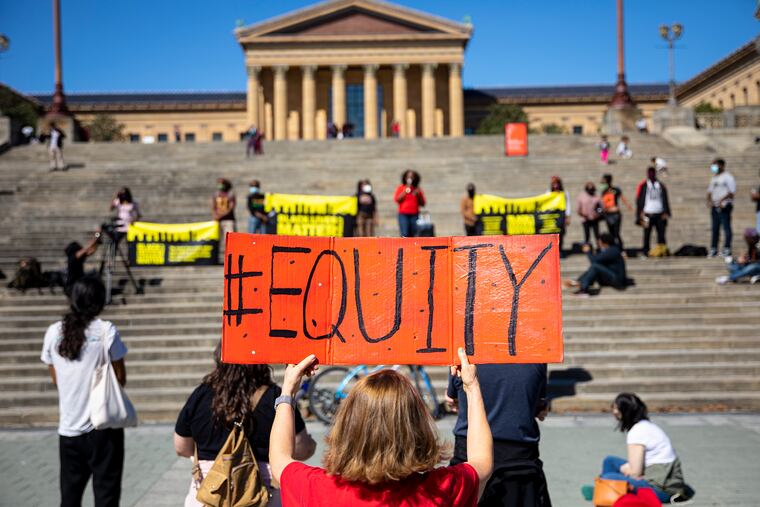Protest morale needs to remain high after Breonna Taylor grand jury decision, Philly organizers say
Rage continued to boil among Black activists Saturday, days after a Kentucky grand jury declined to indict the three white Louisville police officers in the death of Breonna Taylor.

Rage continued to boil among Black activists Saturday, days after a Kentucky grand jury declined to indict three white Louisville police officers in the death of Breonna Taylor, a Black woman who was fatally shot in her Louisville apartment during a botched narcotics investigation.
“We have to organize like our lives depend on it, because they do,” said Krystal Strong, 35, an organizer for the Black Lives Matter chapter in Philadelphia and the Black Philly Radical Collective, a group that advocates for the Black community and has called to defund and restructure the policing system. Standing on the steps of the Philadelphia Museum of Art before a crowd of a couple hundred people in masks, she spoke into a bullhorn. “This is a system willing to kill us in our sleep."
In the wake of highly publicized Black citizens being killed by police — Taylor and Minneapolis’ George Floyd commanded headlines nationwide — Strong and other Black activists encouraged more protests and organizing to protect the Black community. They emphasized there had to be further attention toward guarding vulnerable populations, which included female, transgender, and disabled Black people.
Taylor, a 26-year-old emergency-room technician, died in the hallway of her apartment after the three officers — Brett Hankison, Myles Cosgrove, and Jonathan Mattingly — swarmed her apartment after midnight as part of a drug raid in March.
A recently released grand jury recording stated that Taylor and her live-in boyfriend, Kenneth Walker, were in bed watching a movie with the lights off, not sleeping. The details have further jumbled a report that has been rife with conflicting statements.
Walker took the police to be home invaders and shot once, striking Mattingly in the thigh. The police fired 32 shots in return, at least five of which hit Taylor, killing her immediately.
Louisville officials said they suspected that Taylor’s ex-boyfriend Jamarcus Glover had been using her apartment to receive drugs. A search subsequently turned up no drugs. The Louisville police chief dismissed Hankison from the force but kept on Cosgrove and Mattingly.
The anger in Philadelphia mirrored that of global shock and dismay when only Hankison was indicted on three counts of wanton endangerment. The charges held him responsible for indiscriminately shooting around Taylor’s apartment and endangering three of her neighbors. None of the officers were charged in Taylor’s death.
Philadelphia activists said they were disgusted that the grand jury prioritized the shots Hankison missed over the shots that hit Taylor.
“They’re speaking truth to power,” Marta Guttenberg, 73, a retired pediatric pathologist at the Children’s Hospital of Philadelphia, said of the Black Lives Matter movement. She said she admired the women in the movement, calling them models who “stand for all women.”
In a news cycle that has rotated around two prominent women — the recently deceased Ruth Bader Ginsburg and her potential replacement, Amy Coney Barrett, whom President Donald Trump quickly nominated after Ginsburg’s death — Guttenberg said Barrett was “an example of the false view of the role of women.”
The Philadelphia activists said they will continue to protest the deaths of Black people. They also emphasized that more support is needed for those arrested during protests. Some of those arrested have been unable to post bail, leaving them in jail, said Anthony Smith, 28.
Smith was arrested over the summer in West Philadelphia during a protest. When protesters were released from jail, he said, they were sometimes let out at night without their belongings, leaving them without money or a cellphone.
An Inquirer investigation last year found that about 73% of people booked in jail, or roughly 16,000, were allowed to leave after the city’s Cashier’s Office had closed, effectively stranding them. The city revised its policies after the investigation.
“That s--- is demoralizing,” Smith said.
Despite some setbacks and blows to morale, the organizers said support for local organizers and protesters remained of paramount importance in Philadelphia.
“Stay socially distanced, but bring it in, y’all,” Strong said, wearing a red sweatshirt printed with the uniquely Philadelphia-to-South Jersey term Jawn, with the iconic statue of Rocky in the background. “All Black lives matter.”